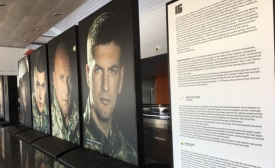public engagement
Some spokespersons have it tough. Think Sean Spicer trying to defend Donald Trump, Ron Ziegler defending Richard Nixon, maybe Dmitry Peskov fronting for Vladimir Putin. But the kind of tough job facing a spokesman that we should really respect is the one performed for the past three years by Col. Andriy Lysenko, spokesman of the Ukrainian armed forces. He comes daily to the Ukraine Crisis Media Center in downtown Kyiv and reports on-the-record on the state of the war in Ukraine’s eastern regions.

Mark Dillen on Ukraine's method of providing public information about the war.

Despite current low levels of trust toward the U.S. from the Iraqi populace, not all hope is lost.
The Obama administration has revamped a program designed to lure foreign fighters away from extremist groups like the Islamic State, focusing on a series of new advertisements and social media posts that seek to appeal to emotion rather than logic. Money for the program, which is managed by the State Department’s Global Engagement Center, tripled this year, to $16 million, after administration officials concluded that past efforts that had attempted to scare potential militants away from the extremist groups were not working.
As part of its efforts to harness digital technologies for public diplomacy, the U.S. State Department has decided to open up its daily press briefings by letting people across the globe tweet their questions in several languages, including Hindi and Urdu.
As part of its initiative to harness more digital technology for diplomacy, the US State Department will be taking questions via Twitter in 10 different languages, and answering them during a press briefing every Friday for the month of January.







